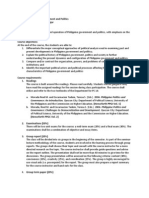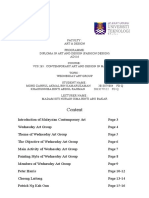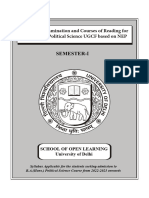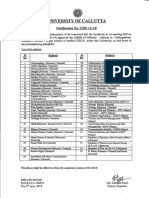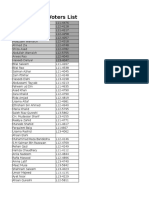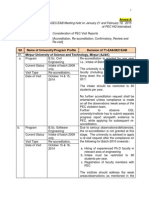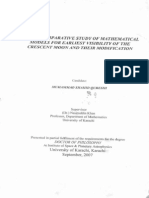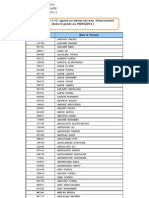SS 102-Pakistan Studies-Shaza Fatima Khwaja
SS 102-Pakistan Studies-Shaza Fatima Khwaja
Uploaded by
Razi BaigCopyright:
Available Formats
SS 102-Pakistan Studies-Shaza Fatima Khwaja
SS 102-Pakistan Studies-Shaza Fatima Khwaja
Uploaded by
Razi BaigOriginal Description:
Copyright
Available Formats
Share this document
Did you find this document useful?
Is this content inappropriate?
Copyright:
Available Formats
SS 102-Pakistan Studies-Shaza Fatima Khwaja
SS 102-Pakistan Studies-Shaza Fatima Khwaja
Uploaded by
Razi BaigCopyright:
Available Formats
Lahore University of Management Sciences
SS102 - Pakistan Studies Spring 2012- 2013
Instructor: Shaza Fatima Khawaja Office: Room no. 102 New SS wing Office Hours: TBA
Course Objectives: This course aims to introduce students to the history of Pakistan, provide an overview of contending perspectives on the origins of the country and examine its politics, society and culture. In addition, it engages with several contemporary issues facing the country including, for example, the state of human rights, economic and human development and the role of regional and ethnic identities.
Grading: Attendance Reading Presentation Group Project - Project Plan - Presentation Quizzes (3) Final Exam Course Structure: The course is roughly divided into 12 themes; 6 historical and 6 contemporary. The class will be divided into 7-9 groups (depending on enrolment) each of which will present on one of the enlisted themes and do a group project on the topic of their choice. Instruments: 1. Group Reading Presentation: Each group will present on one of the reading themes of the course in the corresponding session. The presentation will be expected to present the main arguments presented by the author, the gist of the reading, and its analysis. All members are expected to speak. 2. Group Project: This is an exploratory project (not a research or writing-based one) on topics approved by the instructor. Each group will be expected to write a short 2-page project plan outlining their research scope and method. The project will be presented in class in the last two sessions of the course 5% 10% 5% 10% 30% 40%
with a 3-4 page report. Similar to the reading presentation, groups will have around 7-9 members each of which at least 3-4 must present the project. The project is graded on three fronts: the idea or concept adopted, the project plan, and the final presentation or video etc. Students will be expected to work on the project throughout the course of the semester and discuss their progress periodically with the instructor. 3. Quizzes: There will be 2 announced quizzes in class and 1 unannounced quiz. All quizzes will be based on all that has been covered till the day of the quiz. There will be no make-up quizzes. 4. Final Exam: The final exam will be closed books/closed notes. A major component of this exam will be a subjective, essay question. Only post midterm syllabus will be tested. 5. Attendance: Students are expected to attend all classes. If a student is unable to make it to a session, they must let the instructor and the TA know beforehand. One unexcused absence is allowed.
Course Readings: Session 1 2 Topic Introduction to the Course Indus Valley Civilization Readings
Fitzsimons, Matthew A. 1970. The Indus Valley Civilization. The History Teacher (November). 4(1): 9-22 Kenoyer, J. (1998). People and Professions (127 146). Decline and Legacy of the Indus Cities (173184). In Ancient Cities of the Indus Valley Civilization. Michigan: OUP.
Colonial Period
Aziz, K. K. (1976). The Imperial Impact in The British in India- A Study in Imperialism. Islamabad: National Commission on Historical and Cultural Research. Talbot, Ian. 2005. Colonial Rule, Authoritarianism and Regional History in North West India. In Pakistan: A Modern History. London: Hurst & Co.: 53-65 Ziring, Lawerence. 1999. Before the Beginning (1-22) In Pakistan in the Twentieth Century: A Political History. Karachi: OUP Ziring, Lawerence. 1999. The Formation of Pakistan (23-53). In Pakistan in the Twentieth Century: A Political History. Karachi: OUP
Creation of Pakistan
Sayeed. Khalid. 1968. Conflicting Views about the Origins of Pakistan. In Pakistan: The Formative Phase 1857 1948. Karachi. OUP. 3-12. 5 Civil War and Dismemberment of Pakistan Stephenson, Glenn V. 1968. Pakistan: Discontiguity and the Majority Problem. Geographical Review. 58(2): 195 - 213 Bose, Sarmila. 2005. Anatomy of Violence: An Analysis of the Civil War in East Pakistan in 1971. Economic and Political Weekly. 40(41): 4463 4471 6 Democratization and Military Rule Nasr, Vali. 2004. Military Rule, Islamism and Democracy in Pakistan. Middle East Journal. (Spring) 58 (2): 195-209 Waseem, Mohammad. 2002. Causes of Democratic Downslide. Economic and Political Weekly. 37(44 45): 4532 4538 7 Nation building Nasr, S. Vali. 1997. State, Society and the Crisis of National Identity. In State, Society and Democratic Change in Pakistan, Rasul Bakhsh Rais (ed). Karachi: OUP. 104 - 130. Syed, Anwar H. 1980. The Idea of a Pakistani Nationhood. Polity. 12(4): 575 -597 Ahmed, Feroz .1996. Ethnicity, Class and State in Pakistan. Economic and Political Weekly. 31(47): 3050 3053 8 Identity Formation Rahman, Tariq. 2003. Language, Power and Ideology. In Continuity and Change: Socio-political and Institutional Dynamics in Pakistan. Zaidi (ed). Karachi: City Press. 133- 149 Ahmed, Mumtaz. 1998. Revivalism, Islamization, Sectarianism and Violence in Pakistan. In Pakistan 1997. Baxter and Kennedy (eds). India: Harper Collins 9 Human Rights & Civil Society HRCP. 2011. Freedom of Thought, Conscience and Religion. State of Human Rights in Pakistan. 81 92. HRCP. 2011. Freedom of Expression. State of Human Rights in Pakistan. 93 108 Zaidi, S. Akbar. 2006. Civil and Uncivil Society in Pakistan. Economic and Political Weekly. (Aug19
25). 41 (33): 3556 - 3557 Mustafa, D. 2005. (Anti) Social Capital in the Production of an (un) civil society in Pakistan. Geographical Review. 95 (3): 328 347
10
Terrorism and Islamization
A Great Deal of Ruin in a Nation. 2011. Pakistan, Asia, The Economist, March 31. http://www.economist.com/node/18488344 Rashid, Ahmed. 2012. Changing the Narrative or Preparing for the Worst. In Pakistan on the Brink: The Future of America, Pakistan and Afghanistan. New York: Viking
11
Economic Development
Zaidi, S. Akbar. 2008. Social and Structural Transformations in Pakistan. Economic and Political Weekly. 43 (20): 10-11 Zaidi, S. Akbar. 2005. Poverty, Trends, Causes and Solutions. In Issues in Pakistans Economy. Karachi: OUP: 434-452
12
Education
Bari, Faisal and Nargis Sultana. Inequality in Education. In Annual Status of Education Report 2011.South Asian Forum for Education Development. 15-17. ICG. 2004. Reforming the Education Sector. ICG Asia Report No. 84. (7th October) : 1-30
13 14
Presentations Presentations
You might also like
- SS 114 Pakistan Studies - Culture and Heritage - LUMS Course Outline by Taimur RahmanDocument4 pagesSS 114 Pakistan Studies - Culture and Heritage - LUMS Course Outline by Taimur RahmanAsim JaanNo ratings yet
- Constitutional and Political Development in Pakistan 1947 2012Document3 pagesConstitutional and Political Development in Pakistan 1947 2012Zeesahn100% (1)
- Pol Sci 14Document6 pagesPol Sci 14sue_quirante100% (1)
- Wednesday Art GroupDocument20 pagesWednesday Art GroupZa-c Pelangi SenjaNo ratings yet
- HM 111-Pakistan Studies (Outline)Document6 pagesHM 111-Pakistan Studies (Outline)Yasir MalikNo ratings yet
- Fall 2013 Ucp Course OutlineDocument7 pagesFall 2013 Ucp Course OutlineSyed Sami Ullah ShahNo ratings yet
- Politics in India-1Document11 pagesPolitics in India-1Ragini BordoloiNo ratings yet
- Indian Civilizations, Spring 2023Document5 pagesIndian Civilizations, Spring 2023SnehaNo ratings yet
- Oxford - History-and-Culture-of-South-AsiaDocument22 pagesOxford - History-and-Culture-of-South-Asiasharif ibnshafiqNo ratings yet
- Political Systems in Asia-PacificDocument6 pagesPolitical Systems in Asia-PacificNathaniel LepasanaNo ratings yet
- Pls 101: Introduction To Political Science Instructor: Office: Email: Office Hours: Class LogisticsDocument9 pagesPls 101: Introduction To Political Science Instructor: Office: Email: Office Hours: Class LogisticsAnuar DyussenovNo ratings yet
- UG-PolSc - Cutted PDFDocument33 pagesUG-PolSc - Cutted PDFDona CNo ratings yet
- Four Year UG CourseDocument105 pagesFour Year UG CourseChandan KumarNo ratings yet
- SYLLABUS FYUP-PoliticalScience PDFDocument105 pagesSYLLABUS FYUP-PoliticalScience PDFIshta VohraNo ratings yet
- ANTH 244-Political Anthropology-Ayaz QureshiDocument9 pagesANTH 244-Political Anthropology-Ayaz QureshiNorma GarciaNo ratings yet
- B.A. Hons. Political ScienceDocument41 pagesB.A. Hons. Political ScienceRohit KoriNo ratings yet
- POL 212-Class Structure of PakistanDocument10 pagesPOL 212-Class Structure of PakistanMohammadAhmadNo ratings yet
- Syllabus Islam and PoliticsDocument10 pagesSyllabus Islam and Politicsapa sajaNo ratings yet
- Uet Course OutlineDocument6 pagesUet Course OutlineUsmanAliNo ratings yet
- POS 311 History of Political ThoughtDocument5 pagesPOS 311 History of Political ThoughtOkharedia HanselNo ratings yet
- HIST 3214-POL3116-Violence and Nationalism in Post Colonial States of South Asia-Anushay Malik PDFDocument6 pagesHIST 3214-POL3116-Violence and Nationalism in Post Colonial States of South Asia-Anushay Malik PDFHabib UllahNo ratings yet
- Introduction Class AZADDocument14 pagesIntroduction Class AZADfaysal934ahmedNo ratings yet
- (Oxford in India Readings - Themes in Indian Politics) Partha Chatterjee - State and Politics in India-Oxford University Press (1997)Document591 pages(Oxford in India Readings - Themes in Indian Politics) Partha Chatterjee - State and Politics in India-Oxford University Press (1997)Milton Biswas100% (1)
- Kim - Migration and Citizenship - Spring 2024Document6 pagesKim - Migration and Citizenship - Spring 2024iamnotsupermanhahahaNo ratings yet
- DSC Syllabus 2 - 1438825Document5 pagesDSC Syllabus 2 - 1438825nandinithakur2515No ratings yet
- GENERIC ELECTIVES (GE-3) : Nationalism in IndiaDocument3 pagesGENERIC ELECTIVES (GE-3) : Nationalism in IndiamukharqeqyrwNo ratings yet
- Socio Cultural Dynamincs of Pakistan and GovernanceDocument7 pagesSocio Cultural Dynamincs of Pakistan and GovernanceMudassir FarooqiNo ratings yet
- UG PolScDocument51 pagesUG PolScsudip surNo ratings yet
- HS 524 - Syllabus - Timetable 2019Document4 pagesHS 524 - Syllabus - Timetable 2019Taj UD DIn MalikNo ratings yet
- Pol 1005 SDocument10 pagesPol 1005 SOfentse SeemaNo ratings yet
- 1POLDE0501Document5 pages1POLDE0501sajadzaffarkhanrajputNo ratings yet
- Course OutlineDocument4 pagesCourse Outlinemalihamunir10No ratings yet
- GE 01 Indian Society-Images and RealitiesDocument5 pagesGE 01 Indian Society-Images and RealitiesDeepansh TyagiNo ratings yet
- Uluslararası İlişkiler 1. Dönem Syllabus(1)Document3 pagesUluslararası İlişkiler 1. Dönem Syllabus(1)mervedemir33902001No ratings yet
- B.A. - Political Science Syllabus (Nagpur University)Document14 pagesB.A. - Political Science Syllabus (Nagpur University)Moinuddin Ali Khan100% (2)
- Thai Politics Syllabus PBIC 2017Document7 pagesThai Politics Syllabus PBIC 2017Katja RangsivekNo ratings yet
- Allama Iqbal Open University, Islamabad (Department of Pakistan Studies) WarningDocument6 pagesAllama Iqbal Open University, Islamabad (Department of Pakistan Studies) Warningmh8638550No ratings yet
- Pakistan Studies (PKS-101) After Incorporation of Dynamics of PopulationDocument4 pagesPakistan Studies (PKS-101) After Incorporation of Dynamics of Populationmohammad ashraf nadeemNo ratings yet
- LL.B 05 Year Sylabous 1st YearDocument21 pagesLL.B 05 Year Sylabous 1st Yearmuhammad.daniyal.khan.atdNo ratings yet
- Syllabus For Descriptive Exam - F.4-148-2021-R and F.4-149-2021-R PDFDocument1 pageSyllabus For Descriptive Exam - F.4-148-2021-R and F.4-149-2021-R PDFMasab AsifNo ratings yet
- Course Syllabus Gfpa2013 Sem A122Document10 pagesCourse Syllabus Gfpa2013 Sem A122Riza ZahariNo ratings yet
- Political ScienceDocument13 pagesPolitical ScienceHemanth SNo ratings yet
- Masculin I TiesDocument5 pagesMasculin I TiesMs. Manjari NandyNo ratings yet
- Lecture 01 INTRODUCTION TO PAKISTAN STUDIESDocument10 pagesLecture 01 INTRODUCTION TO PAKISTAN STUDIESThe CopyNo ratings yet
- Nationalism in India Syllabus.Document4 pagesNationalism in India Syllabus.Sakshi SinghNo ratings yet
- Gov - 2105 Fieldseminar Syllabus 2010Document47 pagesGov - 2105 Fieldseminar Syllabus 2010Youcef BenyezzaNo ratings yet
- History SyllabusDocument4 pagesHistory SyllabusMihir MehraNo ratings yet
- Sem 5Document15 pagesSem 5pm4509720No ratings yet
- FA11 220B SyllabusDocument10 pagesFA11 220B SyllabusasdfasdfSSWSNo ratings yet
- Thesis Topics On Political Science in PakistanDocument6 pagesThesis Topics On Political Science in Pakistanmitzilarrickakron100% (2)
- CRASHDocument4 pagesCRASHSharpioNo ratings yet
- MA PAKISTAN STUDIES Course OutlineDocument18 pagesMA PAKISTAN STUDIES Course Outlinemadiha009No ratings yet
- Political ScienceDocument105 pagesPolitical ScienceDeepanshu Gupta100% (1)
- MA InCulture and Media StudiesDocument47 pagesMA InCulture and Media StudiesAbhinav SaraswatNo ratings yet
- 2019 New Syllabus DU Political Science BA Hons SEM IDocument48 pages2019 New Syllabus DU Political Science BA Hons SEM IAlan SaralNo ratings yet
- Syllabus Combined Ad No 3-2023-14Document1 pageSyllabus Combined Ad No 3-2023-14Mr. Muhammad Saddique100% (1)
- B.A Hons Political Science 1st Sem To 6th SemDocument319 pagesB.A Hons Political Science 1st Sem To 6th SemHemant KumarNo ratings yet
- ### Noa021Document6 pages### Noa021hiyyx7No ratings yet
- IR322 21-22-Sec 2Document3 pagesIR322 21-22-Sec 2asdsas asdmnsdNo ratings yet
- Syllabus PSCC 102Document4 pagesSyllabus PSCC 102Red MonteroNo ratings yet
- ACM Voter ListDocument2 pagesACM Voter ListRazi BaigNo ratings yet
- Date Sheet Final Exam-Spring 15stuv5Document6 pagesDate Sheet Final Exam-Spring 15stuv5Mattin SharifNo ratings yet
- Waqas Ahmad Javed: Curriculum VitaeDocument1 pageWaqas Ahmad Javed: Curriculum VitaeRazi BaigNo ratings yet
- Foundation - Analysis - and - Design - (Bowles - 5ed) 244 PDFDocument1 pageFoundation - Analysis - and - Design - (Bowles - 5ed) 244 PDFRazi BaigNo ratings yet
- Irrigation PakistanDocument22 pagesIrrigation PakistanRazi BaigNo ratings yet
- AyatDocument1 pageAyatRazi BaigNo ratings yet
- ReportDocument7 pagesReportRazi BaigNo ratings yet
- Minutes of 71-EA&QECDocument44 pagesMinutes of 71-EA&QECRazi BaigNo ratings yet
- Mirza CV 2013-09-15 3Document1 pageMirza CV 2013-09-15 3Razi BaigNo ratings yet
- AssignmentDocument9 pagesAssignmentRazi BaigNo ratings yet
- Lecture-8 Remote SensingDocument24 pagesLecture-8 Remote SensingRazi BaigNo ratings yet
- Lecutre 9 Pre Disaster ManagementDocument34 pagesLecutre 9 Pre Disaster ManagementRazi BaigNo ratings yet
- GeoinformaticsDocument19 pagesGeoinformaticsRazi BaigNo ratings yet
- God Is He Who Raised The Heavens Without Any Pillars (13:3)Document1 pageGod Is He Who Raised The Heavens Without Any Pillars (13:3)Razi BaigNo ratings yet
- Istikhara DuaDocument3 pagesIstikhara DuaAaliya Zaki ZakiNo ratings yet
- Stylistic Analysis of Surah Al-NaasDocument11 pagesStylistic Analysis of Surah Al-NaasSufyan AliNo ratings yet
- Module - Ii: Parentage in Muslims LawDocument7 pagesModule - Ii: Parentage in Muslims Lawmohd sakibNo ratings yet
- Barak AllahDocument7 pagesBarak AllahUlan Setia NingrumNo ratings yet
- Translation of The Meanings of The Noble Quran in The Telugu LanguageDocument1,304 pagesTranslation of The Meanings of The Noble Quran in The Telugu LanguageSrinivasNo ratings yet
- Alamut PDFDocument5 pagesAlamut PDFcartwheel900133% (6)
- Deeni Maloomat Punjabi GurmukhiDocument79 pagesDeeni Maloomat Punjabi GurmukhiAhmadi MuslimNo ratings yet
- Middle East - Literary BackgroundDocument5 pagesMiddle East - Literary BackgroundSampaga, Lovely Grace FerraroNo ratings yet
- Peh Chan Not Done EmployeesDocument11 pagesPeh Chan Not Done Employeesanandkr21No ratings yet
- Stray ReflectionsDocument15 pagesStray ReflectionsAyeza NadeemNo ratings yet
- As En6 Q2 W1 D1Document10 pagesAs En6 Q2 W1 D1Maricris Pamulaklakin AlmendrasNo ratings yet
- Abu Bakr Al-Sideeq - His Life and Times CD 3 - TranscriptDocument19 pagesAbu Bakr Al-Sideeq - His Life and Times CD 3 - TranscriptsjkrashidNo ratings yet
- LIST of MS ApplicantsDocument8 pagesLIST of MS ApplicantsQamar BukhariNo ratings yet
- Doa Khatam Al-QuranDocument2 pagesDoa Khatam Al-QuranAnizu MN100% (3)
- Shahid Quraishi ThesisDocument302 pagesShahid Quraishi ThesisWWWSCRIBDNET100% (1)
- 10 - Chapter 5 PDFDocument146 pages10 - Chapter 5 PDFجلال الدین تبرائیNo ratings yet
- CRM 411 6th Batch Sessional MarksDocument1 pageCRM 411 6th Batch Sessional MarksRabbi ChowdhuryNo ratings yet
- Social Integration and Communal Harmony in IndiaDocument12 pagesSocial Integration and Communal Harmony in IndiaSwethan AkkenapelliNo ratings yet
- Nursing in Islam: PDF Created With Pdffactory Pro Trial VersionDocument12 pagesNursing in Islam: PDF Created With Pdffactory Pro Trial VersionFarzana AfrinNo ratings yet
- Panitia Dobel Akso Fest AksocpDocument4 pagesPanitia Dobel Akso Fest AksocpClarin AzizaNo ratings yet
- Fauzan Saleh Modern Trends in Islamic Theological Discourse in 20th Century Indonesia A Critical StudyDocument358 pagesFauzan Saleh Modern Trends in Islamic Theological Discourse in 20th Century Indonesia A Critical StudyHabib Milanisti100% (2)
- ATTENDANCE SHEET Part-I 2018Document41 pagesATTENDANCE SHEET Part-I 2018AK MughalNo ratings yet
- DAFTAR MINI BUS DIENG MTSN 3 SdaDocument14 pagesDAFTAR MINI BUS DIENG MTSN 3 SdaUri matiNo ratings yet
- Diasporic Literature JournalDocument8 pagesDiasporic Literature JournalEni PurwaningsihNo ratings yet
- Referat EnglezaDocument2 pagesReferat EnglezaGushovschi ValeriaNo ratings yet
- 2014-2015 Academic CalendarDocument1 page2014-2015 Academic Calendarkashijee40No ratings yet
- Public RelationsDocument3 pagesPublic RelationsDea LhsiNo ratings yet
- IDE1G IDE Grade Principal 08-05-2011Document56 pagesIDE1G IDE Grade Principal 08-05-2011daywalker08950% (2)
- 1.2. Understand How Students Learn: Sample From The PlanDocument10 pages1.2. Understand How Students Learn: Sample From The Planapi-355253675No ratings yet


